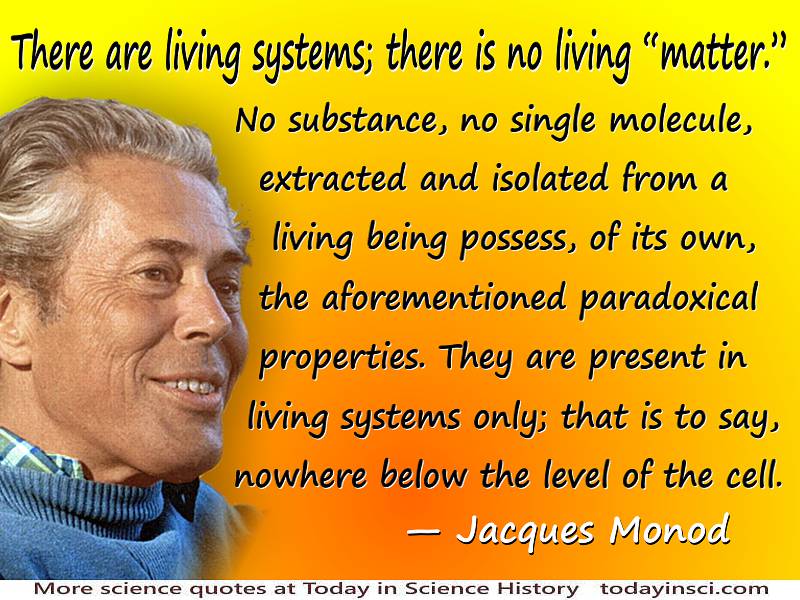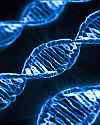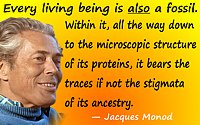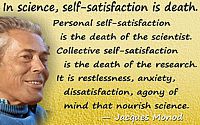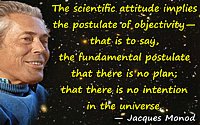 (source)
(source)
|
Jacques Monod
(9 Feb 1910 - 31 May 1976)
French biochemist who shared with his fellow researchers the 1965 Nobel Prize for Physiology or Medicine. They revealed how messenger ribonucleic acid (mRNA) is involved in protein synthesis within a cell. He headed the Pasteur Institute from 1971.
|
Jacques Monod - “There are living systems; there is no living “matter.””
Illustrated Quote - Large (800 x 600 px)
More Jacques Monod quotes on science >>
Context of Jacques Monod's quote, “There are living systems; there is no living ‘matter.’”
Jacques Monod gave an Inaugural Lecture upon taking the chair of molecular biology at the Collège de France (3 Nov 1967). An English translation was printed as a 22-page booklet, From Biology to Ethics, published by the Salk Institute for Biological Studies in 1969. In it, as translated, he declares: 1
“The expression ‘living matter’ is itself senseless.”
His point is that life began, not from any one molecule, but from a system of interacting molecules. Eventually, they included replicating molecules like nucleic acids and catalytic molecules like enzymes. But as essential as they may be to life, and even though it is the molecules alone that comprise the matter, no individual molecule has the property of life. Only when a functional variety of molecules are incorporated together as a system can any semblance of life exist.
In his original statement in French, Monod summarizes this fact as:
Il y a des systèmes vivants; il n’y a pas de “matière” vivante. (There are living systems; there is no living “matter.”)
This remark was followed by the reminder of the quote above: “No substance, no single molecule, extracted and isolated from a living being possess, of its own, the aforementioned paradoxical properties. They are present in living systems only; that is to say, nowhere below the level of the cell.”
2 Alan L. Mackay, A Dictionary of Scientific Quotations (1991), 175.
- Science Quotes by Jacques Monod.
- 9 Feb - short biography, births, deaths and events on date of Monod's birth.
- Jacques Monod - context of quote “Every living being is also a fossil.” - Medium image (500 x 350 px)
- Jacques Monod - context of quote “Every living being is also a fossil.” - Large image (800 x 600 px)
- Jacques Monod - context of quote “There are living systems; there is no living “matter.”” - Medium image (500 x 350 px)
- Jacques Monod - context of quote “There is no intention in the universe” - Medium image (500 x 350 px)
- Jacques Monod - context of quote “There is no intention in the universe” - Large image (800 x 600 px)
- Jacques Monod - context of quote “In science, self-satisfaction is death.” - Medium image (500 x 350 px)
- Jacques Monod - context of quote “In science, self-satisfaction is death.” - Large image (800 x 600 px)
- Origins of Molecular Biology: A Tribute to Jacques Monod, by Agnes Ullmann (ed.). - book suggestion.
